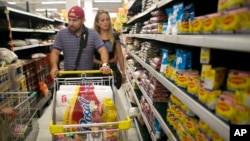U.S. companies operating in Venezuela have escalated the use of an accounting maneuver to insulate themselves from a worsening economic crisis in the South American country that has erased more than $10 billion in profits over the past 18 months.
A growing number of U.S. companies, including Colgate-Palmolive, Procter & Gamble and PepsiCo, began deconsolidating the financial results of their Venezuelan operations in 2015 because of the plunging value of the country's bolivar currency and their inability to set prices on products such as shampoo and laundry detergent.
The OPEC nation's unprecedented economic collapse has caused massive shortages, forcing tens of thousands of Venezuelans to stream across the border for basic goods.
Deconsolidation means that Venezuela operations can largely no longer hurt or benefit a U.S. parent company's financial results. Often companies are taking a big one-time charge against earnings so that they can ring-fence what is left in Venezuela. Avon Products Inc. took an after-tax loss of about $120 million in the first quarter as part of its deconsolidation move.
Absorbing losses
Meanwhile, companies around the globe that have not deconsolidated their Venezuela operations are suffering hits to their income statements. Or they have signaled future writedowns if the country's economy remains in severe distress.
Israel's Teva Pharmaceutical Industries Ltd., for example, in May said it still has about $350 million worth of assets exposed to Venezuela's currency. The company took a $246 million impairment charge in the first quarter following the devaluation of Venezuela's currency.
Devaluations and one of the world's highest inflation rates have forced Teva and a slew of other companies to mark down the value of their assets using less favorable exchange rates. The last official inflation reading from the central bank came in February, and was 180.9 percent.
At the start of 2015, many companies valued their assets using the then-official exchange rate of 6.3 bolivars per dollar. But getting that most favorable rate under a multi-tier currency system was unrealistic amid a severe shortage of dollars.
In March, Venezuela announced the creation of two new exchange rates. The so-called Dipro rate of 10 bolivars per dollar is mainly for priority food and medicines. The other is a floating rate that adjusts based on supply and demand. It has weakened to 641 bolivars per dollar. And on the black market, one dollar costs Venezuelans more than 1,000 bolivars, according to currency website dolartoday.com.
Shipments cut back
Several U.S., European and Asian drug companies have reduced shipments of medicine because they are not able to exchange bolivars for dollars. Pfizer Inc. has disclosed in regulatory filings that it may not be able to operate in Venezuela as it has historically.
Automaker General Motors Co. said its Venezuelan operations may need additional financial support, but no decision has been made to provide it.
"GM has affirmed the continued consolidation of our Venezuelan subsidiaries and the potential for additional financial support for the past four quarters," GM spokeswoman Jenna Pearson said, declining additional comment.
In early 2015, Ford Motor Co. wrote off its investment in Venezuela when it took an $800 million pre-tax writedown.
Deconsolidation will likely remain an attractive option for foreign companies with Venezuelan subsidiaries, which routinely say they cannot access hard currency, obtain raw materials, lay off workers or raise prices to compensate for inflation.
The maneuver also allows them to avoid the drip-drip of losses from Venezuela that have hurt the earnings at so many companies.





